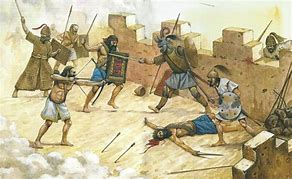When it comes to nations waging war on one another, Christians have advocated three positions.
Activism: It is always correct to support or fight in a war waged by one’s government.
Arguments:
– Government has been ordained by God, and we are to submit to it (1 Pet 2:13-14, Rom 13:1- 4).
– Israel waged war with God’s explicit command
– Government is the parent and educator of the citizen, preserving order. Citizens have a duty to government the way children do to parents. If you do not like your government, you should leave to live under another one (but before they have drafted you for military service).
Pacifism: It is Never Right to Participate in War
Arguments:
– Killing is always wrong (Ex 20:13) 
– Resisting evil with force is wrong (Mat 5:39, Ro 12:19-21)
– War produces more war, more evil, and is rooted in greed.
Selectivism: It is Right to Participate in Some Wars (Just Wars)
While we must submit to government, and while we should seek peace instead of wars, there are certain wars which should be waged, and which Christians should support.
Biblical Truths About War in Scripture
1) Israel’s Canaanite wars:
- Some of the nations had reached a tipping point when it came to sin, and war was God’s judgement on them.
- War seemed to be necessary to prevent Israel from being polluted by the depraved behavior and pagan religions of the nations they overthrew. God told Israel to totally annihilate the Canaanites lest Israel follow their bad example (cf. Ex 23:31; Josh 9:24, 11:20). Israel failed to do so, and the Canaanite traditions (Baal worship, immorality, etc.) had a very negative effect on Israel (cf. Ex 23:33; Num 33:52-56).
- The conquered nations were given time to repent.
- God used natural means to encourage these nations to leave the area (Ex 23:28).
- Those cities placed under a total ban were usually military fortresses or strongholds, such as Jericho. These would have had fewer civilians and existed primarily to keep Israel out.

- Many of the bans included tribes that contained Nephilim and Rephaim, which appear to include major demonic influence.
There’s a significant difference between the OT people of God, Israel, and the NT people of God, the church. Israel was a nation, an ethnically distinct people, the physical descendants of Abraham, Isaac and Jacob. Being a Jew was both a nationality and a religion. Also, they conducted war in response to the direct revelation from God. However, in the NT, God’s people, the church, have no national or ethnic limitations. Christians come from all nationalities and backgrounds. Whereas God commanded physical war for Israel, he commands spiritual warfare for the church (Eph 6:10f). So the NT people of God cannot look back to Israel as an example of how to function politically. We do not conduct religious “crusades” (or jihad) to enforce the Christian way of life.
2) Soldiers who approached John the Baptist were not told to leave their career (Luke 3:14). Paul frequently uses military comparisons to describe the Christian life (cf. Eph 6:11f; 1 Thes 5:8; 2 Tim 2:4). The NT refers to various military officers, but never criticizes such an occupation or suggests that military service is out of bounds for Christians.
3) James 4:1-2 indicates that warfare is a direct result of man’s sin nature. Thus warfare usually comes about because of man’s failure to practice principles of righteousness declared by God.
4) Christians are responsible to submit and obey legitimate authority, such as governments (Rom 13; I Peter 2:13-15). However, when governmental authority and biblical principles conflict, one must follow the Bible (Dan 3-4, Acts 4-5,)
5) The  Hebrew midwives disobeyed government when it sought to take innocent life. Ex 1:17, 20- 21). Therefore, not every war waged by a government is just.
Hebrew midwives disobeyed government when it sought to take innocent life. Ex 1:17, 20- 21). Therefore, not every war waged by a government is just.
6) While the Bible condemns murder (the planned killing of an innocent person), it does not directly forbid killing in war.
7) If God delegates the right to human government to take life through capital punishment, by implication, the same right is extended if justice demands war for a just cause.  The protection of citizens from national aggressors will usually require force, or at least the threat of force.
The protection of citizens from national aggressors will usually require force, or at least the threat of force.
8) Countries can become murderous and thieving, not only individual citizens. National aggressors should be resisted (Gen 14).
9) Jesus commanded his disciples to protect themselves (Lk 22:36, 38). The Sermon on the Mount forbids personal revenge, not self-protection.
10) A “warmonger” is one who profits financially from war. While war may be a necessary means of achieving righteous ends, it is possible to become a “blood thirsty” person who loves and promotes war. Jesus spoke of such in Mt 26:52. He is not condemning those who serve their country in a legitimate war, but those who promote, encourage and for the wrong reasons choose to be involved in warfare.
 – David De Bruyn, Professor of Church History, Shepherds’ Seminary Africa
– David De Bruyn, Professor of Church History, Shepherds’ Seminary Africa

